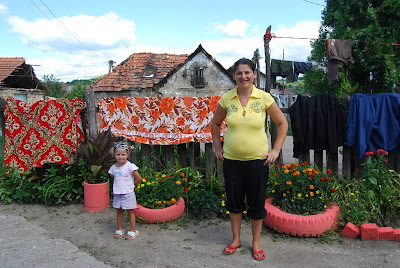Bodvalenke is a small village on the border with Slovakia in Borsod County, Northern Hungary.
Eszter Pasztor, got the idea for the 'Fresco Village' from a trip to Egypt where she visited a village in the desert that, having similar problems of poverty and multi-deprivation, turned itself into a tourist destination by decorating all the walls of its houses with frescoes. It worked. Eszter hopes that because Bodvalenke is beautifully situated in the National Park not far from UNESCO World Heritage Site of Aggletek, tourists will find their way to the village attracted not only by the frescoes but by a range of local crafts, a restaurant and guided walks through the rare marshland with unique flora like wild Fritilliary. All this and a system of micro – loans and a new wood-free (solar storage) eco-heating system for the village, piloted by a German/Hungarian company, will improve the local economy and create jobs. For more info about this wonderful project go to - www.bodvalenke.eu

Kata, Editor of 'Amaro Drom' getting the 'official' story from the Mayor's office!

The second fresco is based on an old Gypsy legend


Janos Horvarth, Roma painter from Miskolc working unpaid at present

Janos shows Kata the best vantage point to view the second fresco

The enchanting landscape of the marsh

Angelika Biro, Roma photographer,taking pictures for 'Amaro Drom'



Hot Dog!

Janos working with one of the village children who are helping him to paint the frescoes

The wall is prepared for the fresco at a cost of 150,00 HuF(£450) which also renovates the property. All house owners enter into a contract to protect and preserve the painting.

The first fresco in the centre of the village

Esther,left, encouraging the basket weavers

This woman pickles more than cucumbers!

Wood collecting on this scale damages the environment - the proposed eco heating system will relieve this pressure.

Traditional Hungarian needlework could also find a market in the craft centre - direct from the maker!

View over the bog from the future craft centre. Some of the houses in the marshy swamp will be relocated.

The beginnings of the third fresco - horses,a stork and a goat will welcome visitors at the southern end of the village.






























































